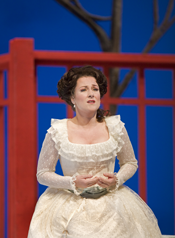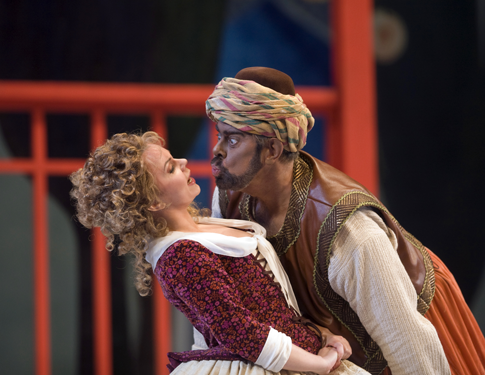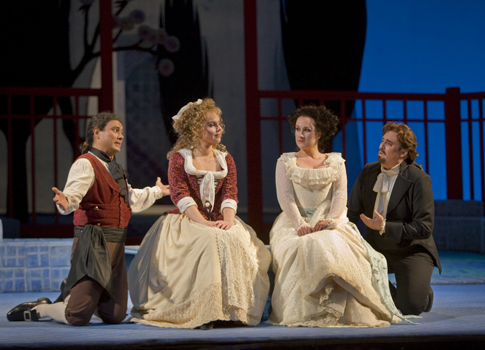
07 May 2008
Die Entführung aus dem Serail
Die Entführung aus dem Serail is too light to be a grand opera, but it makes rather grander demands of its singers than operetta could possibly bear.
English Touring Opera are delighted to announce a season of lyric monodramas to tour nationally from October to December. The season features music for solo singer and piano by Argento, Britten, Tippett and Shostakovich with a bold and inventive approach to making opera during social distancing.
This tenth of ten Live from London concerts was in fact a recorded live performance from California. It was no less enjoyable for that, and it was also uplifting to learn that this wasn’t in fact the ‘last’ LfL event that we will be able to enjoy, courtesy of VOCES8 and their fellow vocal ensembles (more below …).
Ever since Wigmore Hall announced their superb series of autumn concerts, all streamed live and available free of charge, I’d been looking forward to this song recital by Ian Bostridge and Imogen Cooper.
Although Stile Antico’s programme article for their Live from London recital introduced their selection from the many treasures of the English Renaissance in the context of the theological debates and upheavals of the Tudor and Elizabethan years, their performance was more evocative of private chamber music than of public liturgy.
Evidently, face masks don’t stifle appreciative “Bravo!”s. And, reducing audience numbers doesn’t lower the volume of such acclamations. For, the audience at Wigmore Hall gave soprano Elizabeth Llewellyn and pianist Simon Lepper a greatly deserved warm reception and hearty response following this lunchtime recital of late-Romantic song.
For this week’s Live from London vocal recital we moved from the home of VOCES8, St Anne and St Agnes in the City of London, to Kings Place, where The Sixteen - who have been associate artists at the venue for some time - presented a programme of music and words bound together by the theme of ‘reflection’.
'Such is your divine Disposation that both you excellently understand, and royally entertaine the Exercise of Musicke.’
‘And there was war in heaven: Michael and his angels fought against the dragon; and the dragon fought and his angels, And prevailed not; neither was their place found any more in heaven … that old serpent … Satan, which deceiveth the whole world: he was cast out into the earth, and his angels were cast out with him.’
There was never any doubt that the fifth of the twelve Met Stars Live in Concert broadcasts was going to be a palpably intense and vivid event, as well as a musically stunning and theatrically enervating experience.
‘Love’ was the theme for this Live from London performance by Apollo5. Given the complexity and diversity of that human emotion, and Apollo5’s reputation for versatility and diverse repertoire, ranging from Renaissance choral music to jazz, from contemporary classical works to popular song, it was no surprise that their programme spanned 500 years and several musical styles.
The Academy of St Martin in the Fields have titled their autumn series of eight concerts - which are taking place at 5pm and 7.30pm on two Saturdays each month at their home venue in Trafalgar Square, and being filmed for streaming the following Thursday - ‘re:connect’.
The London Symphony Orchestra opened their Autumn 2020 season with a homage to Oliver Knussen, who died at the age of 66 in July 2018. The programme traced a national musical lineage through the twentieth century, from Britten to Knussen, on to Mark-Anthony Turnage, and entwining the LSO and Rattle too.
With the Live from London digital vocal festival entering the second half of the series, the festival’s host, VOCES8, returned to their home at St Annes and St Agnes in the City of London to present a sequence of ‘Choral Dances’ - vocal music inspired by dance, embracing diverse genres from the Renaissance madrigal to swing jazz.
Just a few unison string wriggles from the opening of Mozart’s overture to Le nozze di Figaro are enough to make any opera-lover perch on the edge of their seat, in excited anticipation of the drama in music to come, so there could be no other curtain-raiser for this Gala Concert at the Royal Opera House, the latest instalment from ‘their House’ to ‘our houses’.
"Before the ending of the day, creator of all things, we pray that, with your accustomed mercy, you may watch over us."
The doors at The Metropolitan Opera will not open to live audiences until 2021 at the earliest, and the likelihood of normal operatic life resuming in cities around the world looks but a distant dream at present. But, while we may not be invited from our homes into the opera house for some time yet, with its free daily screenings of past productions and its pay-per-view Met Stars Live in Concert series, the Met continues to bring opera into our homes.
Music-making at this year’s Grange Festival Opera may have fallen silent in June and July, but the country house and extensive grounds of The Grange provided an ideal setting for a weekend of twelve specially conceived ‘promenade’ performances encompassing music and dance.
There’s a “slide of harmony” and “all the bones leave your body at that moment and you collapse to the floor, it’s so extraordinary.”
“Music for a while, shall all your cares beguile.”
The hum of bees rising from myriad scented blooms; gentle strains of birdsong; the cheerful chatter of picnickers beside a still lake; decorous thwacks of leather on willow; song and music floating through the warm evening air.

Die Entführung aus dem Serail is too light to be a grand opera, but it makes rather grander demands of its singers than operetta could possibly bear.
What, then, is it?
Mozart was eager to make a splash in the music scene of Vienna, to which he had just moved, and in the opera scene of Central Europe under a discriminating and forward-thinking patron, Joseph II, and – not a little – as a figure in the Enlightenment, the shining of a new light of universal brotherhood and citizenship in which glow humanity would emerge from the prejudices and bigotries of old. With his delicious Seraglio, Mozart failed and he triumphed: during his brief lifetime, it was the most popular of his operas, a hit throughout the German-speaking world.
Joseph II, himself newly liberated from the restraints of his mother and “co-regent,” Maria Theresa, was seeking new ways to give unity to his disparate realms (from Transylvania to Flanders to Milan). Nationalism seemed a likely card to play and in that cause he created a German national theater in Vienna to which the most talented actors and playwrights were invited. That success inspired him to attempt a German opera company, replacing all the Italian stuff, perhaps building on the ballad-operas that an English import, The Beggars’ Opera, had spun off all across the land. This new plan was not a success – none of the contributions to it were very inspired except Seraglio, the last, for which both Mozart and Joseph had the highest hopes.
Here, as so often, Mozart got carried away: He paid his audiences the compliment of assuming they were intelligent enough to understand what he was up to. Upon a traditional escape-plot, with exotic music inspired by Janissary marching bands, he devised a fable of true love tested – and rewarded, thanks to an enlightened pasha who, alas, never gets to sing anything. But for the resourceful Belmonte and stalwart Konstanze, whose high birth must be demonstrated so as not to let the message seem too revolutionary, Mozart composed music as difficult to sing as it is wonderful to hear. Indeed, only a most Italian-trained singer could possibly get through Konstanze’s music in any decent shape – she may well be the single most difficult role in the dramatic coloratura repertory.
This was not at all the Germanic simplicity Joseph was looking for, and he was a little startled: “Too beautiful for our ears, my dear Mozart, and a monstrous lot of notes,” he is said to have commented. Those inclined to hoot at the monarch for his folly should try to sing either lead role before they do so, or listen to the hash most top-ranked divas make of Konstanze’s arias, whose demands Mozart enhanced to display the phenomenal agility of Salieri’s mistress, Caterina Cavalieri, who created the part. A soprano once told me, “They say ‘Martern aller Arten’ is the toughest thing to sing in the entire repertory, and it’s true – because ‘Ach ich liebte’ cannot be sung!”
 Aleksandra Kurzak as Blondchen and Kristinn Sigmundsson as Osmin in Mozart's "Die Entführung aus dem Serail."
Aleksandra Kurzak as Blondchen and Kristinn Sigmundsson as Osmin in Mozart's "Die Entführung aus dem Serail."
Diana Damrau made rather a splash last fall singing Pamina and the Queen of the Night in alternate performances of The Magic Flute – but Konstanze is a tougher part than either of those, and Damrau’s attractive but not abnormally agile soprano was simply not up to it: colorless trills, tuneless runs, desperate and ill-supported leaps at the pitch that one can’t really justify by reference to her desperate situation in the plot. There were some lovely triplet figures in “Ach ich liebte” and she got through “Martern aller Arten” honorably but not pleasurably. She was less “constant” than one had hoped.
Alexandra Kurzak, who has also made a success of the Queen of the Night, had a far easier time with the far easier role of Blondchen.
Matthew Polenzani has sung Mozart roles – including Belmonte at the City Opera a few years ago, but even more so Ferrando in the Met’s last run of Così fan tutte – with a grace, an elegance, an ease of phrase from top to bottom that place him among the finest Mozart tenors not only of this generation but previous ones – one thought of Wunderlich, Valetti and Gedda. But this time around his Belmonte was rough going – he hit the notes, but the sound was less than delectable, a gravelly quality creeping in. Far more pleasing was the tenor of Steve Davislim, a debutant, as Pedrillo; his preposterous “Moorish” serenade in Act III could have gone on for three or four more verses without wearying the ear. All four singers – despite a little shrillness from Miss Kurzak – reached their peak during the splendid lover’s quarrel quartet that ends Act II, the first “conversational” concertato in opera, from which so much was to develop.
Kritinn Sigmundsson, a witty actor with a fine, house-filling, orotund bass, was almost all one could wish for in an Osmin – the one character untouched by the “enlightened” multicultural benevolence, and therefore the one who makes that achievement seem as impressive as it is. Sigmundsson, alas, lacks the low F’s and E’s that a great Osmin requires – that Kurt Moll and Matti Salminen had – but gave such pleasure it was easy to overlook this flaw. Matthias von Stegmann seemed a bit effete in the non-singing role of the sentimental Pasha – he did wave those long-stemmed roses about a bit much. (Like many other admirers of this opera, I’ve always regretted that the Pasha does not sing – couldn’t we transfer an aria or two from Mozart’s unfinished other Turkish singspiel, Zaide? And maybe drop one of Belmonte’s four repetitive arias to fit it in?)
 Matthew Polenzani as Belmonte, Steve Davislim as Pedrillo, Aleksandra Kurzac as Blondchen and Diana Damrau as Konstanze in Mozart's "Die Entführung aus dem Serail."
Matthew Polenzani as Belmonte, Steve Davislim as Pedrillo, Aleksandra Kurzac as Blondchen and Diana Damrau as Konstanze in Mozart's "Die Entführung aus dem Serail."
The old John Dexter production is restaged at each revival; there is nowadays more beefcake on display (Dexter would have enjoyed that), but in general Max Charruyer’s revisions are sensible, coherent – and funny. David Robertson made rather scrappy work of the exquisite overture, and the flutes were rackety during “Martern aller Arten,” but this lovely little masterpiece’s many parts fell by and large neatly into place.
John Yohalem